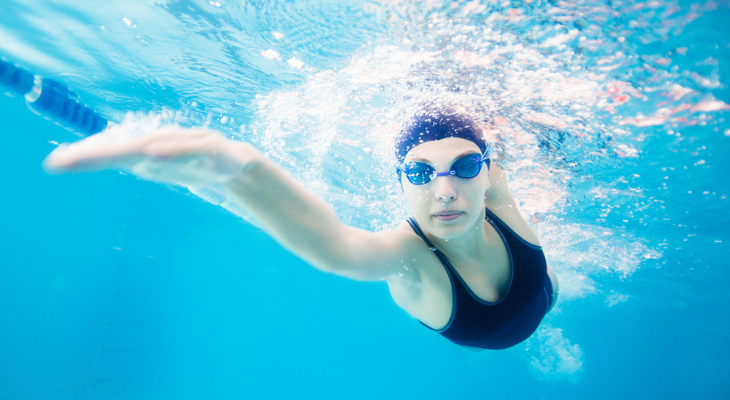
How to Protect Your Eyes at the Swimming Pool
There's no better place to be than a swimming pool on a hot summer day. Although swimming is an excellent way to relax and get a little exercise, spending time in a pool could cause eye discomfort or increase your risk of an eye infection. Fortunately, you can protect your eyes by following a few simple guidelines.
Wear Swim Goggles
Chemicals used to kill bacteria in pools can irritate your eyes, making them red and itchy. Interestingly, irritation may not be caused by the chemicals alone. According to the Centers for Disease Control and Prevention, the combination of pool chemicals and sweat, urine, feces, personal skin products, dirt, and skin cells in the water may be to blame.
When these substances mix with chlorine, irritants called chloramines are created. Chloramines can cause skin and eye irritation, coughing, nasal irritation, and wheezing. Chloramines are reduced if everyone showers before entering the pool and, of course, doesn't use the pool as a toilet.
Swim goggles also help you protect your eyes from the irritating effects of chloramines and also reduce dry eye symptoms. Make sure your goggles fit comfortably but are tight enough to prevent water from entering your eyes. If you normally wear glasses or contact lenses, prescription swim goggles, available from your optometrist, are an excellent option.
Don't Swim in Contact Lenses
Does it take you 10 minutes to find your beach towel because everything looks blurry without your contact lenses? Swimming without your contacts definitely makes locating your spot in the sun difficult. Although wearing your contact lenses in the pool might seem like a good solution, you're more likely to develop a painful eye infection if you don't remove your lenses before swimming.
Contact lenses trap water against your eye. If the water contains bacteria or micro-organisms, you could develop a serious infection that could damage your vision. Bacteria and micro-organisms can be found in pools, lakes, ponds, the ocean, or any body of water.
It's best to leave your contacts in their case when you swim. If you do wear swim goggles with your contact lenses, daily disposable lenses are the best and safest option for your eyes. Make sure the goggles fit well and don't leak. Should your contact lenses come in contact with the pool water, take them out immediately and dispose of them. If you wear reusable lenses, sure to disinfect them before using them again.
Put on a Pair of Sunglasses
Sunbathing without sunglasses can increase your risk of cataracts, macular degeneration, and skin cancer around your eyes. Before you head to the pool, make sure your beach bag includes sunglasses that offer 100 percent protection from Ultraviolet (UV) A and B rays. Any style of sunglasses will be helpful, but wraparound glasses offer the most protection.
Sunglasses also reduce your risk of developing photokeratitis, or sunburn of the eyes. Symptoms of photokeratitis include redness, pain, tearing, blurry vision, and sensitivity to light. Although photokeratitis symptoms usually go away on their own in a few days, wearing sunglasses is an easy way to avoid the uncomfortable condition.
If you wear goggles in the water, make sure the eyewear offers UV protection and reduces glare. When you're out of the water, wear a hat to shade your eyes, in addition to wearing sunglasses.
Do you need a new pair of sunglasses? Contact our office to schedule an appointment for an eye exam.
Sources:
American Academy of Ophthalmology: What Is Photokeratitis - Including Snow Blindness, 6/3/21
U.S. Masters Swimming: Answers to Several Common Eye-Related Health Questions, 3/4/15
